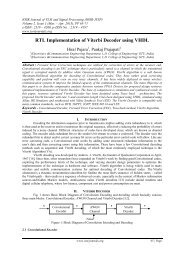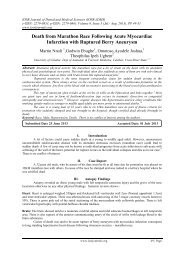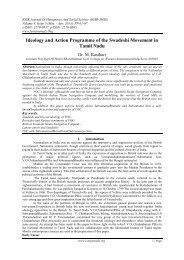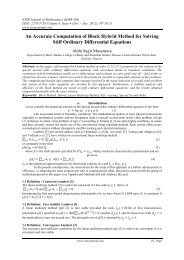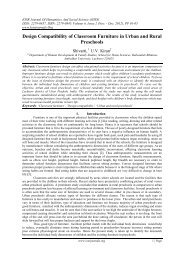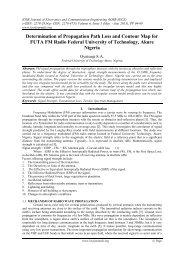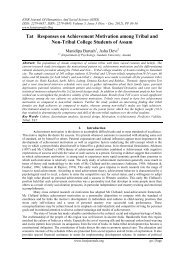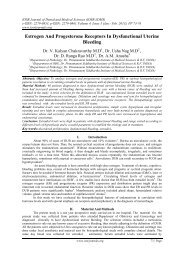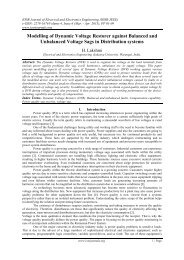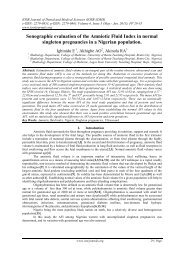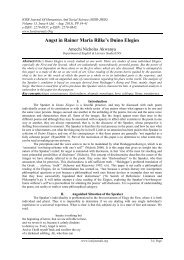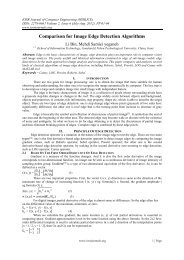Initial Conquest of India by Turks and Their Slaves - IOSR
Initial Conquest of India by Turks and Their Slaves - IOSR
Initial Conquest of India by Turks and Their Slaves - IOSR
You also want an ePaper? Increase the reach of your titles
YUMPU automatically turns print PDFs into web optimized ePapers that Google loves.
Internal Conflicts <strong>and</strong> African Development: The Nigerian Experience<br />
III. Relative Deprivation Thesis <strong>and</strong> the Foundation <strong>of</strong> Internal Conflicts in Nigeria<br />
Previous researches <strong>and</strong> scholarly endeavours have advanced theoretical bases for underst<strong>and</strong>ing the<br />
reason for conflicts. These postulations, which arose out <strong>of</strong> hypothetical explanations, all drive towards<br />
rationalizing conflicts within human societies <strong>and</strong> further serve as body <strong>of</strong> knowledge towards achieving<br />
research ends. Though they are many good ones, this work relies on the “Relative Deprivation” theory <strong>of</strong><br />
conflict as a suitable instrument for explaining internal conflicts in Africa. In discussing the theory, this work<br />
underst<strong>and</strong>s the problems facing the African societies as arising from contests <strong>by</strong> various groups over means <strong>of</strong><br />
development. African societies lack in the basic variables <strong>of</strong> development from either the underst<strong>and</strong>ing <strong>of</strong> the<br />
modernization scholars <strong>and</strong> the dependency scholars. As a polity, most African states have not developed the<br />
operational variables to sustain the system. These variables which includes under the “Capability” <strong>and</strong> political<br />
institutionalization, the participatory variable <strong>of</strong> political mobilization, political integration <strong>and</strong> political<br />
representation (Jaquaribe, 1969) are lacking in most African societies. Rather, in line with Varma’s (1975)<br />
postulation, African societies parade the state systems which have largely taken resort to more <strong>of</strong> coercion than<br />
consensus. The consequence as he <strong>of</strong>fered further is not only the development <strong>of</strong> tension but also a complete<br />
dissolution <strong>of</strong> the entire society. The society exists in bits. Dem<strong>and</strong>s from the state thence take the form <strong>of</strong> group<br />
<strong>and</strong> sub-group dem<strong>and</strong>s for participation <strong>and</strong> representation in the common good, while each maintains a<br />
different good <strong>and</strong> goal. Denial or perceived denial from equal participation in this effort amount to deprivation<br />
<strong>and</strong> leads to the wide complain <strong>of</strong> relative deprivation.<br />
Relative Deprivation theory is <strong>of</strong> the view that interface with goal directed behaviour creates frustration<br />
which in turns, leads to aggressive response usually directed against the reputed to be the cause <strong>of</strong> the frustration<br />
(See Gurr, 1968; Dowse <strong>and</strong> Hughes, 1972). The proponents <strong>of</strong> this view see conflict as the outcome <strong>of</strong><br />
deprivation <strong>of</strong> groups in society vis-à-vis other groups; that is, what one should get relative to what others whom<br />
one identifies as one’s peers or equal are getting. This condition derives out <strong>of</strong> scarcity <strong>and</strong> usually, competition<br />
for scarce socio-economic resources remains the basic causative factor for inter-ethnic conflict (Nwanegbo,<br />
2005), <strong>and</strong> generally, mostly, conflicts among human existents. It has to do with recognizing justice. Without<br />
recognition <strong>of</strong> justice (in sharing <strong>and</strong> public interest), in exchange <strong>and</strong> distribution <strong>of</strong> resources, problem arises.<br />
According to Zartman (1997: 124), unequal divisions are unacceptable <strong>and</strong> most time negotiation stalemates.<br />
Thus unequal norms can also be interpreted as a different kind <strong>of</strong> equality, not in exchange for the other party’s<br />
contribution but in exchange for one’s contribution. The justifying criterion shifted from an international<br />
(between parties) to an internal (within party) exchange. Such equalizing is the meaning <strong>and</strong> purpose <strong>of</strong> equality<br />
in the legal sense, where various instances <strong>of</strong> compensatory justice are involved to temper the severity <strong>of</strong> partial<br />
justice principles (Duetsh, 1985; Homans, 1961; Adams, 1965; Messe, 1971).<br />
Relative Deprivation is very suitable in the attempt at finding out the place <strong>of</strong> conflict in Africa’s<br />
underdevelopment. Firstly, it links the numerous problems <strong>of</strong> conflicts in Africa to a cause. It helps us to<br />
underst<strong>and</strong> that the numerous problems in Africa are predominantly contention for the resources (as will be seen<br />
in the next section). To make this argument’s sustainable, we should know that resources are scarce relative to<br />
human needs every where, but <strong>of</strong> peculiar circumstance is Africa having been exploited, <strong>and</strong> as post colonial<br />
states <strong>and</strong> being still, an appendage <strong>of</strong> the imperialist countries <strong>of</strong> the world Junior partners in the international<br />
division <strong>of</strong> labour <strong>and</strong> thence, subjected to unequal exchange <strong>and</strong> denied <strong>of</strong> investible surpluses from their<br />
economy. The scarcity generated <strong>by</strong> this, leads to high struggle for the few resources <strong>and</strong> as groups, inordinately<br />
lumped together, conflict ensures in various magnitudes.<br />
The essence <strong>of</strong> this is that conflict is permanently generated when there is a disagreement among<br />
various interests in the society over the appropriation <strong>of</strong> the resources. Those deprived, then, in many ways try<br />
to get advantage or disrupt the skewed appropriation. <strong>Their</strong> instruments could either be their ethnic group, their<br />
religious group, their corporate group etc. It is relevant in underst<strong>and</strong>ing also that the problem <strong>of</strong> development in<br />
Africa is not totally removed from the various country’s social injustices which colonialism, through its<br />
developed <strong>and</strong> transferred government structure introduced to African’s heterogeneous societies <strong>and</strong> untechnically<br />
merged nations (Coleman, 1986). To Elaigwu (2005) the conflicts (political) in Nigeria can be traced<br />
to two factors, which borders on Nigerian federalism. They are the structural imbalance in the federal system,<br />
<strong>and</strong> the differential spread in the pattern <strong>of</strong> western education. Though, as rightly stated, these situations do not<br />
just spark <strong>of</strong>f… conflicts (Nnoli, 1978). As could be deciphered from the earlier explanation <strong>of</strong> relative<br />
deprivation thesis, it arose out <strong>of</strong> insufficiency. It has to be re emphasized again that when items are insufficient<br />
only few would have access to it. When such few are in control, the remaining people may start seeing<br />
themselves as being deprived. They would naturally make efforts to balance the situation or change their<br />
disadvantaged position. Failure to achieve the balance usually leads to frustration, then confrontations, struggle,<br />
conflicts <strong>and</strong> violence. This as has been mentioned is specific on political conflicts <strong>and</strong> does not therefore<br />
explain the entire conflicts as none politically motivated conflicts are numerous.<br />
This situation is exacerbated, as it is in the case <strong>of</strong> Nigeria <strong>and</strong> in most other African countries where<br />
the State is the major provider <strong>of</strong> employment. Political parties are largely, either regionally or ethnically based.<br />
www.iosrjournals.org<br />
25 | Page



